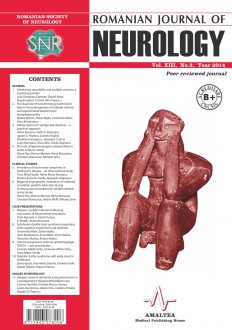SELECT ISSUE

Indexed

| |

|
|
|
| |
|
|
|

|
|
|
|
|
|
| |
|
|
HIGHLIGHTS
National Awards “Science and Research”
NEW! RJN has announced the annually National Award for "Science and Research" for the best scientific articles published throughout the year in the official journal.
Read the Recommendations for the Conduct, Reporting, Editing, and Publication of Scholarly work in Medical Journals.
The published medical research literature is a global public good. Medical journal editors have a social responsibility to promote global health by publishing, whenever possible, research that furthers health worldwide.
PREVALENCE OF NON-MOTOR SYMPTOMS IN PARKINSON’S DISEASE – AN OBSERVATIONAL STUDY
Titus Mihai Vasile, Adina Maria Roceanu, Florina Antochi and Ovidiu Alexandru Bajenaru
ABSTRACT
Objectives. This study aim is to evaluate the prevalence of non-motor symptoms in Parkinson’s disease
Methodology. We conducted an observational study in a prospective approach on a cohort of 70 patients admitted with a diagnosis of Parkinson’s disease in the Neurology Department of the University Emergency Hospital Bucharest for pre-surgery assessment or referred for a consultation to the Outpatient Department of Neurology of the Central Military Emergency Hospital, “Carol Davila” in the last two quarters of 2007, using a technique based on questionnaire (NMSQuest).
Results. Patients included in this study were generally elderly, with a long relative history of disease. They are mostly in the moderate stage of disease and used treatment regimens with combinations of drugs. Prevalence of some non-motor symptoms according to the answers of patients in NMS questionnaire (NMSQuest), like: depression, memory impairment sleep disturbances, sexual disturbances, „light head”, constipation was statistically significant high in our group of patients.
Conclusions. Non-Motor Questionnaire (NMSQuest) can be a useful clinically tool for detecting the common nonmotor symptoms in patients with Parkinson’s disease. Prevalence of non-motor symptoms in Parkinson’s disease is high and require further evaluation of their impact on patient’s quality of life.
Keywords: Parkinson disease, non-motor symptoms, prevalence, NMSQuest
Full text | PDF
